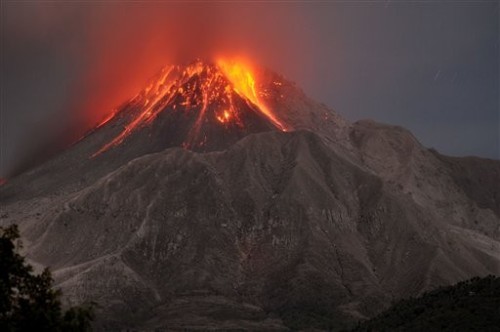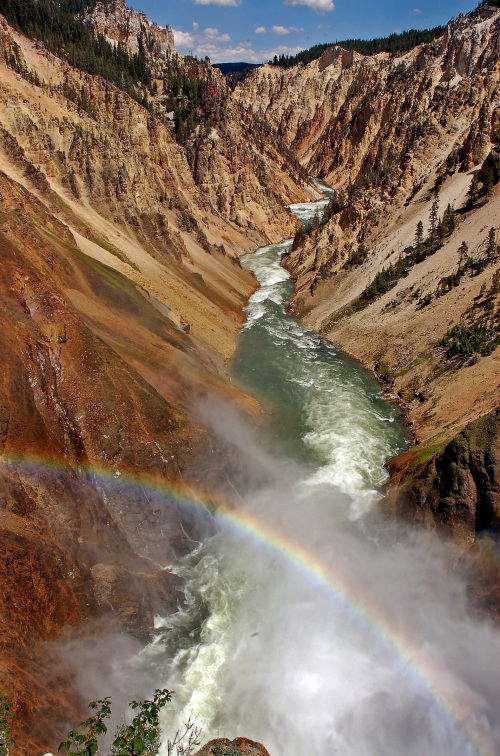Scientists predict that if the largest super-volcano underneath Yellowstone National park in Wyoming explodes in the near future -- for the first time in around 600,000 years -- it could wipe out two thirds of the United States.
 |
The Soufriere Hills volcano erupts in the Caribbean island of Montserrat, Saturday, January. 23, 2010. (AP) |
According to the Daily Mail on Tuesday, the super-volcano has been rising at a record rate since 2004. Its floor has gone up three inches per year for the last three years.
Dan Dzurisin, a Yellowstone Expert told the U.S. Geological Survey at Cascades Volcano Observatory in Washington State: “Clearly some deep source of magma feeds Yellowstone, and since Yellowstone has erupted in the recent geological past, we know that there is magma at shallower depths too,” reported the Daily Mail.
“There is so much heat coming out of Yellowstone right now that if it wasn’t being reheated by magma, the whole system would have gone stone cold since the time of the last eruption 70,000 years ago.”
Scientists claim that when the super-volcano erupts, it would be a thousand times more powerful than the Mount St Helens eruption in 1980.
The effect of the super-volcanic eruption could be so strong that it would dwarf the effect of Iceland’s volcano, which erupted in April last year.
 |
A rainbow arcs over the canyon at the Lower Falls of the Yellowstone River in Yellowstone National Park.(MCT) |
Yellowstone National Park’s caldera has erupted three times in the last 2.1 million years and researchers monitoring it claim we could be in for another eruption. However, with the lack of data, researchers are unable to put a date on when the next eruption might take place.
Robert B. Smith, professor of geophysics at the University of Utah, who has led a recent study into the volcano, was reported as saying, “Our best evidence is that the crustal magma chamber is filling with molten rock.
“But we have no idea how long this process goes on before there either is an eruption or the inflow of molten rock stops and the caldera deflates again,” said Smith.
By Moon Ye-bin (
yebinm@heraldcorp.com)
Intern reporter
Edited by Hannah Stuart Leach
<관련 기사>"옐로스톤 거대 화산 폭발때 美 3분의2 파괴"
과학자들, 60만년만인 가까운 미래 가능성 경고
미국 옐로스톤 국립공원 아래에 있는 세계 최대 화산이 60만년만인 가까운 미래에 폭발하면 미국의 3분의 2가 사람이 살 수 없는 불모지로 변할 수 있다고 과학자들이 경고했다.
영국 일간 데일리메일 인터넷판은 유타대학의 밥 스미스 등 화산활동 전문가들이 이같이 우려했다고 24일(현지시각) 보도했다.
신문에 따르면 옐로스톤 국립공원 아래 '슈퍼 화산'이 2004년 이후 기록적인 속도로 상승하고 있으며, 최근 3년간은 연간 3인치(7.62㎝가량) 융기했다. 이는 1923년 관측이래 가장 빠른 속도다.
과학자들은 만약 이 화산이 폭발하면 1980년 분출한 워싱턴주 소재 세인트헬렌스산의 위력보다 1천배나 강력할 것으로 전망했다. 세인트헬렌스산의 대폭발은 미국 역사상 가장 경제적 손실이 컸던 화산 폭발로 알려졌다.
이뿐만이 아니다. 문제의 슈퍼 화산 폭발로 식물 성장에 치명적인 구름재가 1천마일 떨어진 지점까지 날아가 10피트나 되는 두꺼운 층을 형성할 것이라는 우울한 전망도 내놓았다.
지난해 4월 아이슬란드 에이야프얄라요쿨 화산 폭발에 따른 화산재 분출로 항공 대란이 발생한 것보다 훨씬 큰 재앙을 가져올 수 있다는 것이다.
옐로스톤 국립공원의 칼데라는 210만년 사이 세 번 폭발했는데, 최근 폭발은 64만년 전으로 이후 30여 차례의 소규모 분출이 잇따랐다.
과학자들은 또 다른 폭발이 있을 수 있다며 화산활동을 관찰하고 있지만 땅 아래 깊은 곳에 마그마 지대가 분포하는 등 현실적인 어려움 때문에 분석자료가 부족해 다음 재난이 언제 닥칠지 정확한 예측이 어렵다고 지적했다.
스미스는 "이 국립공원이 매우 넓은 지역에 걸쳐 있는데 융기속도가 빨라 놀랐다"며 "우리가 10㎞ 깊이에서 마그마를 봤을 때는 그렇게 걱정하지 않았지만 그 깊이가 깊어질수록 훨씬 우려하게 될 것"이라고 말했다.
(연합뉴스)










![[Today’s K-pop] Blackpink’s Jennie, Lisa invited to Coachella as solo acts](http://res.heraldm.com/phpwas/restmb_idxmake.php?idx=644&simg=/content/image/2024/11/21/20241121050099_0.jpg)
